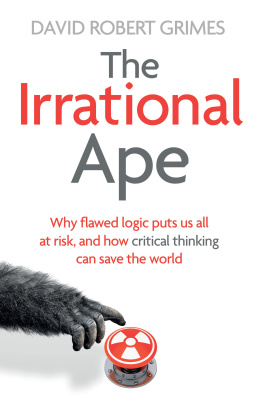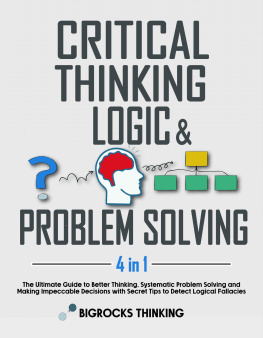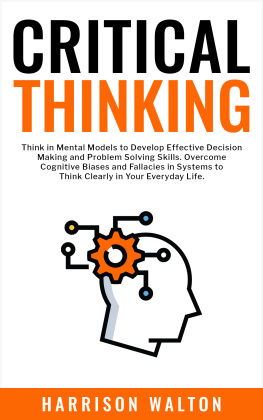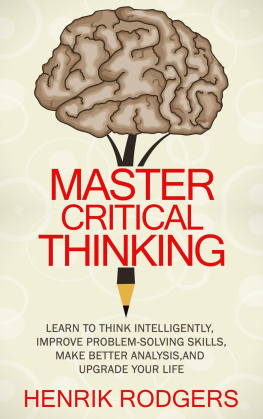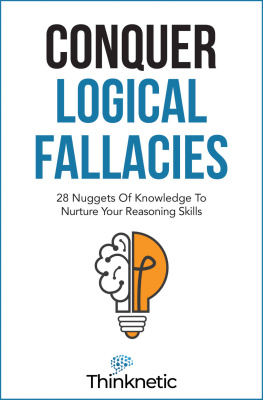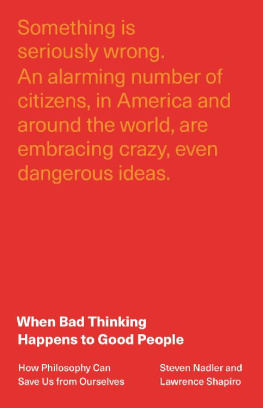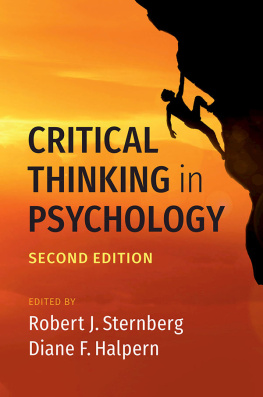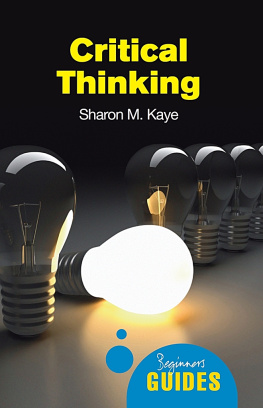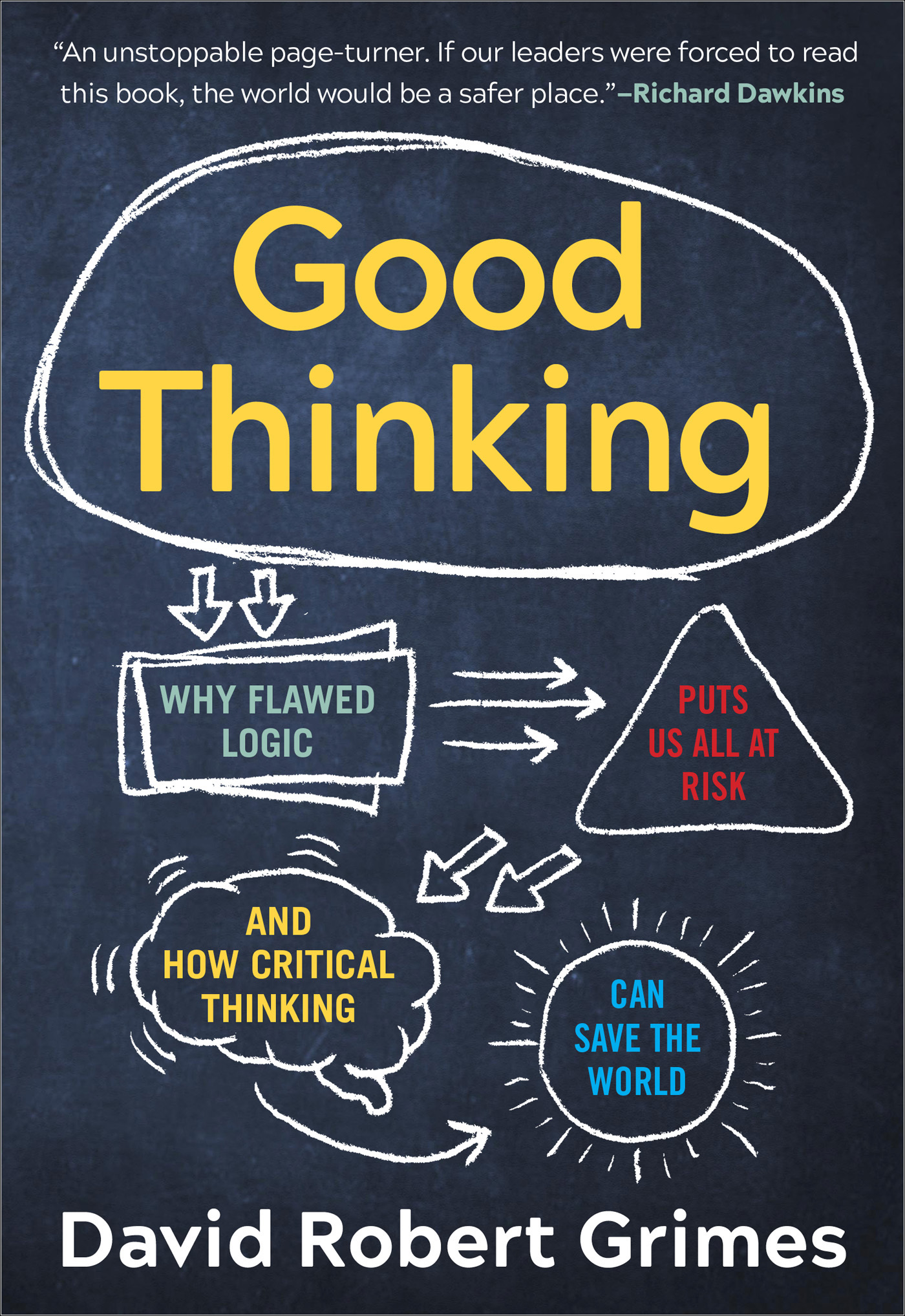Contents
Guide
Page List
ACCLAIM FOR
Good Thinking

From anti-vaxxers to DunningKruger, from homeopathy and astrology to false balance (what I call the BBC Fallacy), from misused statistics to nuclear brinkmanship, our irrationality could be our undoing. A book exposing the irrational ape and teaching us to mend our ways might so easily have become all preachy and teachy. Instead, such is David Robert Grimess storytelling skill, his book is an unstoppable page-turner. If our leaders were forced to read this book, the world would be a safer place.
Richard Dawkins
A beautifully reasoned book about our own unreasonableness.
Robin Ince
Grimess book addresses an all-too-urgent contemporary political question: How do we protect our societies and ourselves from charlatans and fools?... It brings a fresh perspective, and has been painstakingly researched. This spirited cocktail of data leavened with anecdotes is served up in Grimess trademark provocative, combative style... a highly creditable debut from a skilled communicator.
John Gibbons, The Irish Times

G ood T hinking: Why Flawed Logic Puts Us All at Risk and How Critical Thinking Can Save the World
Copyright 2019 by David Robert Grimes
Originally published in the UK as The Irrational Ape by Simon & Schuster UK in 2019. First published in North America in revised form by The Experiment, LLC, in 2021.
All rights reserved. Except for brief passages quoted in newspaper, magazine, radio, television, or online reviews, no portion of this book may be reproduced, distributed, or transmitted in any form or by any means, electronic or mechanical, including photocopying, recording, or information storage or retrieval system, without the prior written permission of the publisher.
The Experiment, LLC
220 East 23rd Street, Suite 600
New York, NY 10010-4658
theexperimentpublishing.com
THE EXPERIMENT and its colophon are registered trademarks of The Experiment, LLC. Many of the designations used by manufacturers and sellers to distinguish their products are claimed as trademarks. Where those designations appear in this book and The Experiment was aware of a trademark claim, the designations have been capitalized.
The Experiments books are available at special discounts when purchased in bulk for premiums and sales promotions as well as for fund-raising or educational use. For details, contact us at info@theexperimentpublishing.com .
Library of Congress Cataloging-in-Publication Data available upon request
eISBN: 978-1-61519-794-1
Cover design by Beth Bugler
Text design by M Rules
Author photograph by Abe Neihum
To Mathilde, Danny, and Laura
for the inspiration, the ideas,
and the encouragement
Contents
Preface
When future historians come to chronicle the early 21st century, one curious paradox may epitomize the era in which we now live. The advent of the internet in the final decade of the 20th century promised the entire repository of the worlds information at our very fingertips, and a new dawn of mutual understanding that would transcend the confines of geography or politics. Fewer sages foresaw, however, that the same technology would enable the propagation of falsehood at staggering velocity to huge, receptive audiences. Fewer still predicted this would leave us more polarized and divided than ever before. The upheaval and division that define our current epoch will no doubt intrigue those future historians. Navigating our way now, without the benefit of hindsight, is an abiding challenge. With such a confluence of contradictory aspects, it is small wonder were frequently left feeling overwhelmed, and an ostensible old Chinese curse is frequently recited: May you live in interesting times.
Fittingly perhaps in this age of disinformation, this invocation is apocryphalthere is no such idiom in Chinese. Its a benign misconception, but the unsettling reality is that many of the delusions we harbor can cause us serious harm. As I write this in late 2020, we are in the midst of the COVID-19 crisis. In this first pandemic of the information age, weve witnessed the emergence of a shadow plague: an infodemic, where facts, half-truths, and outright fabrications haphazardly entangle, virulently spreading as much as the pathogen that created the havoc in the first place. In a vacuum of uncertainty, rumors and myths move aggressively to fill the void. In the sound and fury, we have seen a dark renaissance of conspiracy theory, propaganda, and disinformation exert a worrying influenceabout 30 percent of the US population, for example, believe COVID-19 to be a hoax or deliberately engineered, despite the ample evidence to the contrary.
Inevitably perhaps, these bogus claims have become serious impediments to societal cohesion and collective well-being. Something as simple as face masks have become politicized. Around the world, protests against their apparent imposition have become a unifying flashpoint for something more fundamental: a focal point of contention. Beyond this superficial edifice lies a litany of conspiracy theoriesthat the virus is a hoax, or caused by 5G, or is an odious plot by Bill Gates and some sinister cabal. The astute observer too would notice the heavy involvement of the anti-vaccine community, alternative health advocates, and even supporters of QAnon, the outlandish far-right conspiracy theory that insists a secret organization of Satan-worshipping pedophiles runs the world. The stark reality is that the enduring legacy of the COVID era may not be solely the pandemic but a dawning awareness of quite how susceptible we are to poisonous fictions.
It is vital to note, though, that this was a problem long before we all began to become more aware of it with the furor over COVID. When the first edition of this book was released in Europe in late 2019 as The Irrational Ape, coronavirus was not a household term. Even then, the book was replete with myriad stories of how and why we get things wrong, which resonate all the louder thanks to our recent history. Some of the problems we face are age-old: Our psychological quirks make us perennially vulnerable to emotive and incendiary fictions. We remain dangerously pliable to manipulation, a fact that has not gone unnoticed by malicious actors in arenas from politics to medicine. Our self-curation of modern media has led us to deeper divisions and mutual hostility than ever, and we are easily misled by the misrepresentation of everything from logic to statistics.
When the book was released in Europe, the subject was undoubtedly timely. And as the truly staggering events of the last year make clear, the topics explored within have only increased in urgency and importance. The motivation behind this book is to explain why we go so badly askew with our reasoning, and how we can steel ourselves against these frequently damaging missteps. Understanding why we err is critical if were to circumvent the worst consequences of unclear thinking: Unless we are acutely aware of where we go wrong, we can easily blunder into mistakes that cause us real harm. Critical thinking is the only shield we have against the machinations and ineptitude of charlatans, fools, and demagogues. Our real challenge now and in the future is not accessing information, but rather learning how to critically evaluate the deluge of claims to which were subjected.


